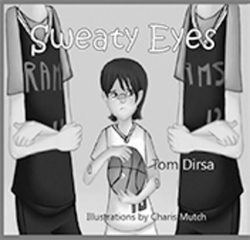Pipestone Flyer
Samara Paine
Pipestone Flyer
Tom Dirsa, a former coach and educator as well as a current free-lance reporter for the Pipestone Flyer, has recently released his first written children’s book, Sweaty Eyes, based on one of his grandson’s real experiences.
Growing up in Cape Cod, Massachusetts, Tom had always had a strong interest in history and archaeology, and originally studied anthropology and geology. Influenced by various teachers along the way, he instead decided to study to become an educator. After graduating, he moved to Alberta to teach, coach and work as a school administrator for many years. Through teaching, his love for children grew and he enjoyed seeing the wide eyes of young students who were enthusiastic about learning new things. He loved helping and encouraging kids to learn to read and write and has seen two of his former students publish their own books since retirement, one becoming a best seller. During his career as a basketball coach, he enjoyed encouraging kids to get involved in teamwork and physical activity through the sport.
Tom Dirsa was always inspired by his teachers and favourite authors, including Ernest Hemingway and Robert Frost. His love for writing came along with his love for stories and the ideas, messages and memories they can hold. Tom has used his writing ability to write various magazine articles, and a few books including an autobiography of his coaching career. Since his retirement, he has also been combining his love for history and writing to contribute many thoughtful articles to the Pipestone Flyer. With dozens of sitting stories in the making, he hopes to continue writing books for both children and adults.
Sweaty Eyes is based on a combination of a few true stories of his grandson, B.J. Having participated in basketball since grade four, B.J. was asked one day to fill in for a player for one of the junior high team’s games. Because of his ADHD, B.J.’s eyes would often water and he would simply dismiss it, saying they were only sweaty.
Tom also discussed some of the important messages he’d love to get across to both children and parents through his book. From his experience as a teacher and basketball coach, he wants to tell youth of all ages to do the very best they can in the time they have, “Success isn’t necessarily always winning - it is doing your best in the immediate for immediate results. It is not perfection, but improvement. The outcome of your work isn’t important if you have tried your best and if you’ve done your best, then you’ve succeeded. You are a winner even if you don’t always win.” Another message he hopes children receive is the importance of teamwork, and using each other’s individual gifts and skills to succeed as a team. He also stresses how important it is to see the, “bigger picture” as a group. Everyone on the team contributes and no one should take blame because they believe it’s their fault for the team’s loss.
Finally, he states that the things you struggle with should never limit your goals and dreams. You should never set aside your hopes because of what other people say, even if you really are limited in some areas. B.J., although he struggles with ADHD and is shorter than most of his teammates, was able to work hard and achieve his dream of playing basketball with his schools junior boys team. Towards the end of Sweaty Eyes, B.J.’s coach tells him, “…you played with heart and desire and determination... I do not know if you will ever be on a winning team, B.J., but I do know that you are a winner!”
Sweaty Eyes is available for purchase at www.dreamwritepublishing.ca for $8.95, and is also sold at the Artisan Markets in Leduc, Sherwoord Park and Edmonton. Tom suggests that Sweaty Eyes is around a grade six reading level and is oriented towards the 8-13 age group.
Tom also hopes to continue writing to create a series of books about his and B.J.’s real experiences and true incidents. Through the series, he hopes to relate to children with ADHD, and wants to remind parents with children who have ADHD to have patience. He is also in the midst of working on a story about Lucky, an endangered right whale, and those who are working to increase the right whale’s population.
Finally, he shared a few tips to help and encourage younger writers. “They say it takes 10,000 hours to get good at something, so write as often as you can! Writing to yourself or in a journal can be helpful for brewing ideas. If you just start writing, ideas will start flowing. If you plant a small idea, just like a seed, and mull over it or simply let it sit, it will eventually grow into an elaborate idea. Write about what you already know and love, as that will make stories a lot easier to plan out.” He also mentions that since you never know how people will react to your writing, just go for it. No matter what, you can know that you succeeded nonetheless by doing the best you could.